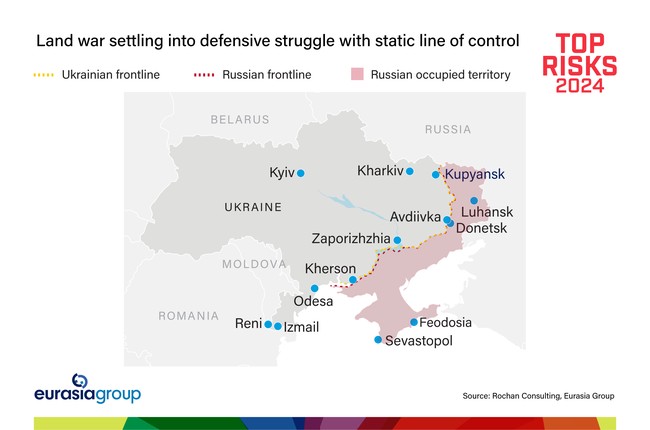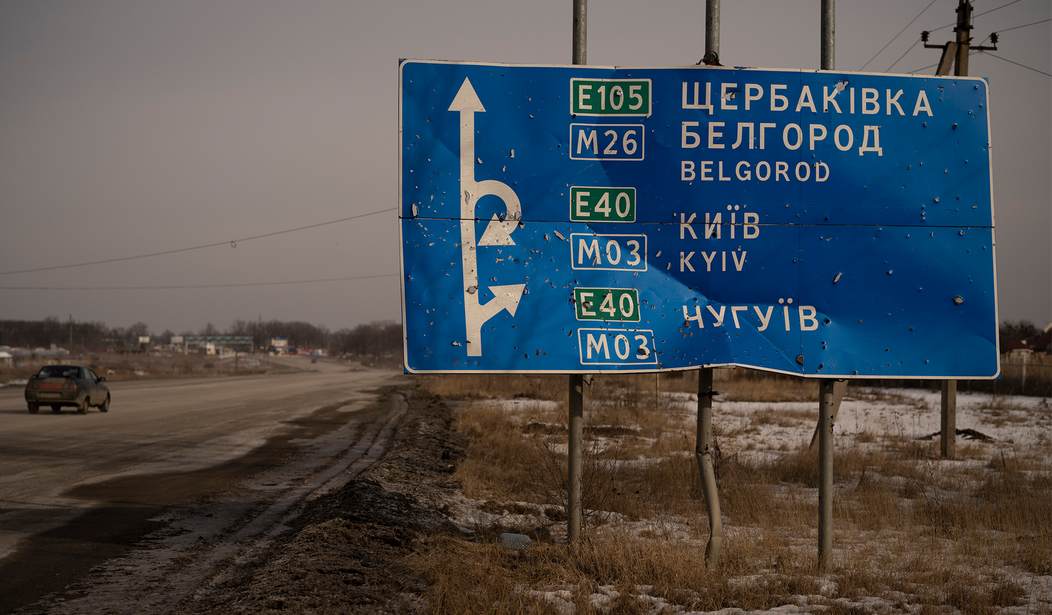In 2024, Ukraine will become a de facto partitioned country as the bloody stalemate drags on and the relatively static front line calcifies. So says Eurasia Group, a geopolitical risk consultancy.
Eurasia Group founder and President Ian Bremmer, along with the company chairman, Cliff Kupchan, release an annual top-ten list of global political risks at the beginning of each year. Ukraine settling into a divided state (at best) is number three on Bremmer and Kupchan's assessment for 2024. (Emphasis is in the original.)
Ukraine will be de facto partitioned this year, an unacceptable outcome for Ukraine and the West that will nevertheless become reality. At a minimum, Russia will keep control of the territory it now occupies on the Crimean peninsula and in Donetsk, Luhansk, Zaporizhzhia, and Kherson oblasts—about 18% of Ukraine's territory—as the war settles into a defensive struggle with a fairly static line of control. But Russia now has the battlefield initiative and a material advantage, and it could take more land in 2024. This year is an inflection point in the war: If Ukraine doesn't solve its manpower problems, increase weapons production, and set a realistic military strategy soon, it could “lose” the war as early as next year.

I confess that the idea of that horrific war finally ending — even if it means someone "lost" — is thrilling to me. And in truth, Ukraine began to lose its eastern region to Russia under Obama's presidency. Moscow annexed Crimea in 2014 and no one did anything about it. So when the weakest president in U.S. history took office in January 2021, Putin naturally began teeing up his next move. Who wouldn't?
He couldn't have been any more obvious about what he was doing, mobilizing and stationing troops along the border — and once again, no one did anything about it. Looking back, it seems eastern Ukraine was already lost at that point. The subsequent fighting has been but a gory formality. In the end, Russia is bigger and has more resources to throw at this thing.
The material balance has also shifted in Russia's favor. On manpower, Russia is attracting significant numbers of men to new contracts, so a politically fraught second mobilization this year is unnecessary for now. President Vladimir Putin has also successfully converted his economy into a war operation. Roughly one-third of government spending and 6% of GDP will be devoted to the war in 2024, and Russian domestic production of missiles and artillery shells is now greater than before the war. North Korea is providing a large volume of additional ammunition, and Iran continues to provide (and now produce in Russia) drones (please see Top Risk #5).
Ukraine is in a more troubled position. On manpower, it must mobilize and train new recruits to improve force quality. Kyiv is considering mobilizing 500,000 additional troops, which is probably impossible but shows the quandary Ukraine is in as it confronts the army of a much larger country. Kyiv also needs to scale up its domestic defense production, especially of drones for the battlefield and to hit targets inside Russia.
Russia's material advantage will be reflected on the battlefield, where Moscow has seized the initiative and is now attacking in Donetsk Oblast, showing limited but effective offensive capability for the first time in over a year. Russia will form additional armies with fresh recruits and continue to develop offensive capability, ratcheting up the pressure on Ukraine.
Of course, none of this is happening in a vacuum. Eurasia Group correctly assesses that the U.S. is losing its enthusiasm for feeding the now nearly two-year-old conflict. Europe, alarmed at the war in its backyard, is trying to ramp up support, but it may or may not be able to compete with Russia's unsavory pals, China, North Korea, and Iran. Unless another big country jumps into the trenches with the Ukrainians, they may not have many options anymore.
Everyone loves to worry about what a desperate Vladimir Putin might do, but Bremmer and Kupchan are the first prominent voices I've seen worry about what a desperate Zelenskyy might do:
Diminishing Western support and growing political infighting will leave Ukraine feeling increasingly desperate, which will cause President Volodymyr Zelensky to become more risk-acceptant … He will turn to asymmetric warfare away from the frontlines in an attempt to degrade the Russian military, keep Ukraine in the headlines, and potentially bring NATO into the conflict. More targeted killings are likely, focusing on individuals connected to the war and occupation. The Ukrainians will also launch deep strikes with drones and missiles in Crimea and Russia targeting military and economic infrastructure—possibly including Russian oil and grain facilities on the Black Sea, which would lead to global oil and food market disruptions. Attacks are also likely on the Kerch Strait Bridge, Russian railroads, and Russian cities, which would provoke stepped-up Russian attacks against Ukrainian cities. The risk of a miscalculation or accident that results in NATO casualties and draws the United States more directly into the war will be heightened accordingly.
Many of us grew up in an America still cocky and proud of its role in vanquishing evil in WWII, but that America no longer exists. Worse still, much of Europe was the bad guys in that war, and they've largely given up bothering to maintain serious fighting forces since then. In the other corner is what Eurasia Group calls an Axis of Rogues. Hostilities between us and them are best avoided.
I've written before that U.S. and EU globalists have a great deal of financial interest in Ukraine, including existing businesses as well as signed contracts for financing reconstruction and building "green" energy-generating infrastructure to power Europe. I don't see them giving up that much investment lightly. But I also don't see any of them jumping in to fight for it themselves. The time to shut down Russian encroachment was before 2014.
Related: J.D. Vance and the Ukraine Realist Lobby
No one wants to lose a war, but history happens. If bigger nations won't join the Ukrainian War (and let's pray they don't, because world wars are the pits), then the world owes it to them to negotiate an end to the bloodshed. Eastern Ukraine has been part of Russia before, and Russia will no doubt continue to entrench itself and "normalize" its conquered lands to date. Maybe it's time to call it a draw and cut everyone's losses. Let's call on both sides to stop the damned fighting. An uneasy Russia-Ukraine fault line is nothing new.










Join the conversation as a VIP Member